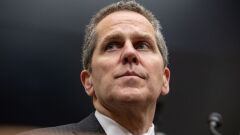WASHINGTON — It's
This week marked the first in the House Financial Services Committee's programing for the larger GOP effort. It ended largely the same way it began —
That said, the GOP's ant-ESG campaign (and the Democratic response) is still important to watch, as the national debate sets the stage for state-level debates across the country. And in some cases, depending on the outcome of the 2024 presidential race, the conversations that lawmakers are having now could set the stage for legislation down the line.
Here are four takeaways from the week's marathon hearings on ESG.










